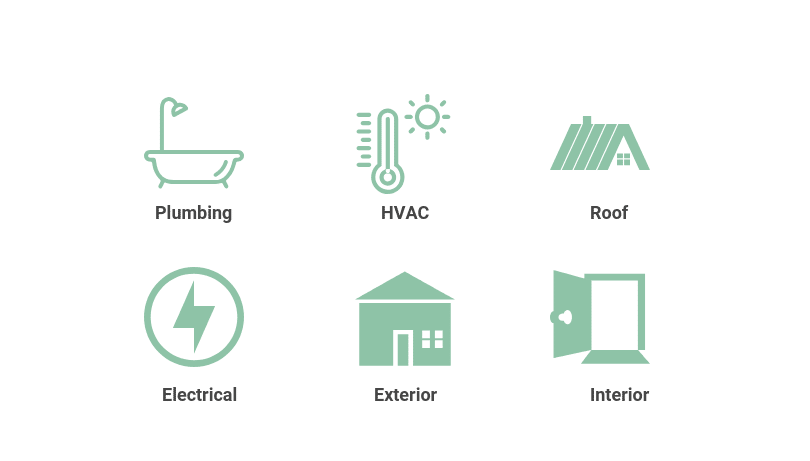
Published
Why Buyers Pay For Inspections | Inspection vs. Appraisal | What Inspectors Look For | Can I Do My Own Home Inspection? | FAQs
Home buyers typically pay for a home inspection before they close on the purchase of their new home. The cost of a home inspection is separate from the closing costs that are calculated and paid at the end of a sale.
Even though a home inspection isn’t required, most buyers pay for one before the deal is finalized to help identify unknown issues with the house. Home inspections give the buyer a chance to renegotiate or back out of the deal if the inspector finds anything unexpected.
A home inspection usually takes place shortly after the seller accepts an offer.
Technically, a buyer’s agent could negotiate to get the seller to pay for the home inspection, but that’s unusual. Buyers pay for an inspection because it’s their responsibility to make sure the home they’re purchasing is in acceptable condition.
🔑 Key Takeaways
- Buyers usually pay for a home inspection, which is scheduled after their offer is accepted.
- A home inspection isn’t a requirement, but it’s almost always done to protect the buyer from acquiring a house with unknown issues.
- A home inspection costs an average of $338, but ranges from $250 to $400 or more for a large house. Home inspectors expect this payment on or before the date of the inspection.
- A general home inspection is typically a contingency that gives the buyer a chance to renegotiate or back out of the deal if an inspector finds unknown damage or defects in the home.
Why Do Buyers Pay for Home Inspections?
Home buyers are responsible for doing their own due diligence on a property before closing day, which includes paying for a home inspection.
Even though most states have seller disclosure laws requiring home sellers to tell the buyer about any known defects in their home, the seller might not be aware of some problems.
» MORE: How to Negotiate After a Home Inspection and Win.
Home inspections aren’t mandatory, but they’re almost always included as a sale contingency to protect the buyer. Because the decision to get the home inspected is optional, the buyer’s responsible for the inspection fee.
Paying $250 to $400 for a home inspection is nothing compared to the thousands of dollars you might have to pay if you buy the house without an inspection and discover problems later on.
Is a Home Inspection the Same as an Appraisal?
A home inspection and a home appraisal are different things.
- A home inspection evaluates a home’s condition. It is not required but it is usually used by a buyer to ensure they know everything they can about the home’s current state before their purchase is finalized.
- A home appraisal verifies a home’s value. It is required by mortgage lenders before they release their loan. Appraisals are sometimes called “lender inspections.”
Certified home inspectors do home inspections , and licensed real estate appraisers do appraisals.
🤔 What about a pre-inspection?
A pre-inspection is a home inspection that’s done before a house is listed for sale. Sometimes home sellers get a pre-inspection in the hopes of speeding up the selling process and reassuring potential buyers they’re being transparent about the condition of the home. A home seller pays for a pre-inspection.
What Do Home Inspectors Look At?

During a home inspection, an inspector will check:
- Plumbing function, including leaks and low water pressure
- HVAC function, including the age of the system and temperature reading
- Roof condition, including its age, structural integrity, and status of the shingles
- Electrical function, including the state of outlets, light switches, fixtures, and more
- Exterior condition, including siding, rain gutters, and more
- Interior condition, including status of floors, drywall, countertops, and more
After the inspection, a home inspector will prepare a written report that documents all of their findings.
If the inspector identifies unexpected problems, the buyer can renegotiate the sale price with the seller, request that the seller cover the cost of repairs, or cancel the purchase agreement.
General vs. specialized home inspections
Home inspection companies often offer two kinds of inspections to home buyers:
A general home inspection evaluates the home’s overall condition and identifies any problem areas. It is a common contingency a buyer includes in their offer when they’re purchasing a new home.
A specialized inspection investigates a specific potential problem, like dangerous radon levels or termite infestation. They’re also used to identify problems unique to a region.
Home inspection companies often offer specialized tests to home buyers for an additional fee.
Can I Perform My Own Home Inspection?
Home buyers are allowed to perform their own home inspection, but we don’t recommend it.
You might think you’re saving money doing the inspection yourself, but unless you have extensive knowledge and experience when it comes to construction, electrical engineering, and plumbing, you’re better off paying a professional.
Home inspectors complete hundreds of hours of education to be certified, so they know what to look for. An inspector will catch problems you’re likely to miss, potentially saving you thousands of dollars down the road.
A great buyer’s agent can help you find a trusted local home inspector.
FAQs
How do I find a home inspector near me?
Real estate agents often have relationships with home inspectors, so your agent might be able to recommend one.
If you have to find a home inspector on your own, Google "home inspectors" in the area you're buying a home. A legitimate home inspector will prominently display their home inspection certification on their website, and you'll probably be able to read customer reviews on their Google listing or elsewhere.
Before you hire one, call several local home inspectors and ask for quotes to compare.
How much does a home inspection cost?
A home inspection costs $250 to $400, with the national average cost for a home inspection coming in at $338 according to data from HomeAdvisor.
Should the seller be present at a home inspection?
It's best for the home seller not to be present during the home inspection.
Sticking around for the inspection could signal to the buyer that you're concerned about what the inspector might find, even though the property is still yours and you have the right to be there.
Can I get a home inspection reimbursement from the seller?
Home buyers are responsible for scheduling and paying for a home inspection if they want one, so they won't get reimbursed by the seller.
Even if the inspector identifies a major problem and the buyer decides to withdraw their offer to purchase the home, the seller doesn't have to reimburse the buyer for the cost of the inspection.
Related Links
If you want to learn more about the process of buying or selling a home, check out more of our great real estate content.
How Can I Lower My Closing Costs? Buying a home is expensive, especially when you add in all of your closing costs! Find out what you can do to minimize your closing costs and keep more money in your pocket.
The Role of the Real Estate Agent. Real estate agents assist home buyers and home sellers — but a lot of people don’t understand what they do or how they get paid. Learn more about the role real estate agents play in home sales.


Leave a Reply